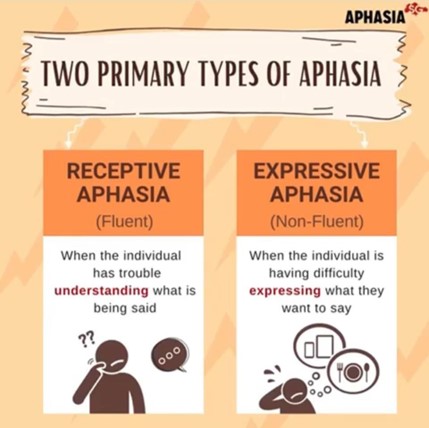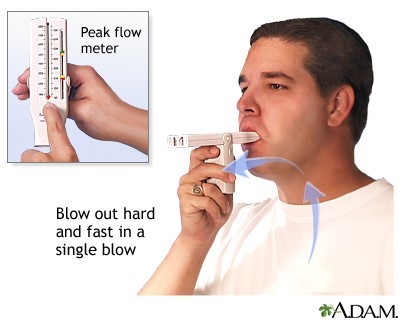A nurse is collecting data from a client who had a stroke and is unable to name common items.
The nurse should recognize that the client is experiencing which of the following types of aphasia?
Receptive aphasia.
Expressive aphasia.
Global aphasia.
Sensory aphasia.
The Correct Answer is B

This type of aphasia is caused by damage to the frontal lobe of the brain, which affects the ability to produce language.
People with expressive aphasia can understand speech and know what they want to say, but they have difficulty saying words or forming sentences.
They may speak in short phrases that require a lot of effort.
Choice A is wrong because receptive aphasia is a type of fluent aphasia that affects the ability to comprehend language.
People with receptive aphasia have difficulty understanding speech and may produce meaningless words or sentences.
Choice C is wrong because global aphasia is the most severe type of aphasia that affects both the production and comprehension of language.
People with global aphasia cannot speak many words and do not understand speech.
They also cannot read or write.
Choice D is wrong because sensory aphasia is not a common term for a type of aphasia.
It may refer to Wernicke’s aphasia, which is another type of fluent aphasia that affects the ability to produce meaningful language.
People with Wernicke’s aphasia can speak fluently but often use incorrect or invented words or phrases.
Nursing Test Bank
Naxlex Comprehensive Predictor Exams
Related Questions
Correct Answer is D
Explanation
This food has the highest vitamin C content among the four options, with about 80 to 100 mg of vitamin C per fruit.
Vitamin C is a water-soluble vitamin that acts as an antioxidant and helps with wound healing, immune function, collagen synthesis, and iron absorption.
Choice A is wrong because 1 medium fresh green pear has only about 4 to 5 mg of vitamin C per fruit.
Pears are a good source of fiber and potassium, but not vitamin
C. Choice B is wrong because 1 small apple with the skin has only about 8 to 9 mg of vitamin C per fruit.
Apples are a good source of fiber and flavonoids, but not vitamin
C. Choice C is wrong because 1 small banana has only about 10 to 11 mg of vitamin C per fruit.
Bananas are a good source of potassium, magnesium, and vitamin B6, but not vitamin
Correct Answer is A
Explanation
This is because the nurse should first assess the client’s baseline knowledge and readiness to learn before providing any teaching.
The nurse should also tailor the teaching to the client’s individual needs and preferences.
Choice B is wrong because showing the client a video demonstration of peak flow meter use may not be the most effective way of teaching if the client has different learning styles or needs.
The nurse should also involve the client in the learning process and not just rely on passive methods.
Choice C is wrong because observing the client using the peak flow meter is an evaluation step that should be done after teaching and reinforcing the correct technique.
The nurse should not assume that the client knows how to use the peak flow meter without assessing their knowledge first.
Choice D is wrong because emphasizing the importance of the daily use of the peak flow meter is a motivational strategy that should be done after assessing the client’s knowledge and providing teaching.
The nurse should also explain the rationale and benefits of using the peak flow meter, not just tell the client to do it.
A peak flow meter is a small device that measures how fast a person can forcefully blow air out of their lungs in one fast breath.
It is one indicator of airways changes that may occur in people with asthma or COPD.
To get a peak flow meter, speak to a doctor.

Whether you are a student looking to ace your exams or a practicing nurse seeking to enhance your expertise , our nursing education contents will empower you with the confidence and competence to make a difference in the lives of patients and become a respected leader in the healthcare field.
Visit Naxlex, invest in your future and unlock endless possibilities with our unparalleled nursing education contents today
Report Wrong Answer on the Current Question
Do you disagree with the answer? If yes, what is your expected answer? Explain.
Kindly be descriptive with the issue you are facing.
